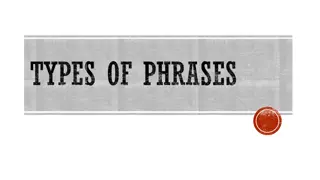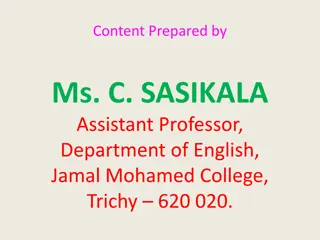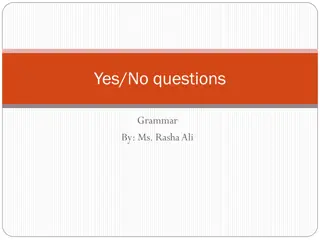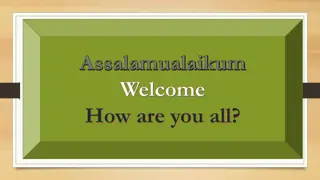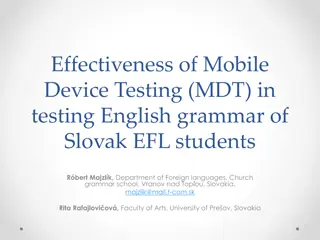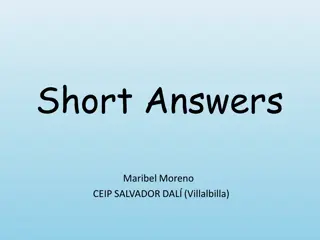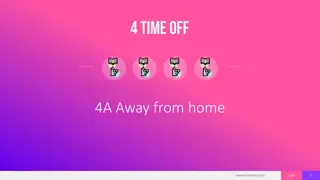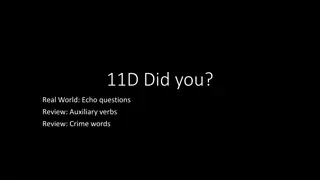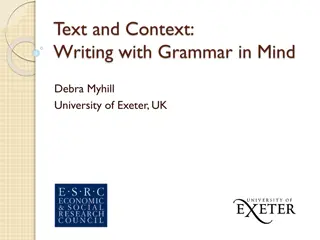Understanding Different Types of Questions and Short Answers in English Grammar
This content covers various question forms in English grammar, including general questions, special questions, alternative questions, tag questions, direct and indirect questions, yes-no questions, and short answers. It explains the structure and usage of each type of question with helpful examples to facilitate comprehension of question formation in English.
Download Presentation

Please find below an Image/Link to download the presentation.
The content on the website is provided AS IS for your information and personal use only. It may not be sold, licensed, or shared on other websites without obtaining consent from the author. Download presentation by click this link. If you encounter any issues during the download, it is possible that the publisher has removed the file from their server.
E N D
Presentation Transcript
Vocabulary List Question word- Who, Whose, Which, What, Where, When, How long, What time, How often, Howmuch, How many, How, Why? Auxiliary verb pal gdarb bas v rds e.g. Do, does, am, is, are, did, was,were, has, have, had Subject teikuma priek mets e.g. He, she, they, Peter, Anna, boy, girl, teacher Verb darb bas v rds e.g. Run, read, learn, smile Object papildin t js (ko?) Agita Ozoli a, Jelgava State Grammar School
Kinds of Questions: General questions or Yes-No questions (visp r gie jaut jumi) e.g. Do you enjoy watching comedies? Have you been abroad? Special questions or Wh- questions e.g. Which is your favourite colour? Where do you live? Alternative questions (izv les jaut jumi) e.g. Did he only watch the game or did he take part in it? Is he a student or a worker? Tag questions (atdal mie jaut jumi astes jaut jumi) e.g. John is a schoolboy, isn he? John is not a student, is he? Direct & indirect questions e.g. Where do you live? direct q. Could you tell me where you live? indirect q. Agita Ozoli a, Jelgava State Grammar School
Yes-no Questions (General Questions) He is ready. Is he ready? Yes, he is./No, he isn t. 1)auxiliary/ modal verb +2)subject +3) main verb+ 4)the rest of the question ? He likes reading. Does he like reading? Yes, he does./No, he doesn t. e.g. 1. 2. 3. I am playing basketball. Are you playing basketball? She is good at Math. Is she good at Maths? I know English well. Do you know English well? She speaks French. Does she speak French? They travelled last year. Did they travel last year? She has been in London. Has she been in London? He can run fast. Can he run fast? 4. Agita Ozoli a, Jelgava State Grammar School
Yes-no Questions (General Questions) Short Answers Yes/No, + pronoun+ auxiliary/ modal verb (positive, negative) Are you playing basketball? Yes, I am./ No, I m not. Is she good at Maths? Yes, she is./ No, she isn t. Do you know English well? Yes, I do./ No, I don t. Does she speak French? Yes, she does./ No, she doesn t. Did they travel last year? Yes, they did./ No, they didn t. Has she been in London? Yes, she has./ No, she hasn t. Can he run fast? Yes, he can./ No, he cannot. (can t) Agita Ozoli a, Jelgava State Grammar School
Remember! He has got a mobile phone. Has he got a mobile phone? Yes, he has./ No, he hasn t. He has a mobile phone. Does he have a mobile phone? Yes, he does./ No, he doesn t. Agita Ozoli a, Jelgava State Grammar School
They arrived yesterday. Did they arrive yesterday? You have heard about it. Have you heard about it? I should visit them. Should you visit them? Did he have to speak to her? He didn't have to speak to her. I have to buy some books. Do you have to buy any books? He has to buy some books. Does he have to buy any books? Was he supposed to speak to me? He wasn't supposed to speak to me. She won't fall down. Will she fall down? He used towalk his dog. Did he use to walk his dog? He has your chocolate. Does he have your chocolate? Agita Ozoli a, Jelgava State Grammar School
Alternative Questions A Yes-No question or A Yes-No question/ a phrase? e.g. Are you happy here or do you want to go home? Is he a student or a worker? Did he go to bed early or did he stay up late? Will the lessons begin at 8 orat 9 o clock? Has George or Harry bought new sportswear? Agita Ozoli a, Jelgava State Grammar School
Wh Questions (Special Questions) Question words: what, who, whose, whom, which, where, when, why, how, how many/much how often (long, far) what time Agita Ozoli a, Jelgava State Grammar School
Question words How much does this book cost? 5 What time does your mother go to work ? 9 a.m do you go to the beach? Rarely. How often is this coat? It s Jack s. Whose is your bag? The big blue one. Which is that? It s Peter. Who have you been married? Ten years. How long are you crying? Because I am sad. Why did you start school? In September. When Country is bigger, England or Spain? Which Pence are there in a pound? 100 How many What colour is a kiwi fruit? It s green. Agita Ozoli a, Jelgava State Grammar School
Wh Questions The Subject question Who/what + verb(3rd person) + the rest of the question ? She plays football? I play football. They play football. Who plays football? Who plays football? Who plays football? I left the door open. She left the door open. Who left the door open? Who left the door open? Something happened yesterday. What happened yesterday? They are absent. They don t like garlic. Who is absent? Who doesn t like garlic? Agita Ozoli a, Jelgava State Grammar School
Wh Questions The object questions: 1)Question word + 2) auxiliary/ modal verb + 3) subject + 4) main verb + 5) the rest of the question ? do, does, did infinitive Question W. + auxiliary/ modal verb + subject + verb + other words? When, where, why.... am, is, are, was, were as in the sentence have, has, had, can... e.g. What are the students reading? Who did you meet? Which is your favourite song? Agita Ozoli a, Jelgava State Grammar School
Wh Questions Subject Object Ted called Ann. Who called Ann? Subject Object Ted called Ann. Who did Ted call? Agita Ozoli a, Jelgava State Grammar School
Who, what? Tom lives in Paris. Who lives in Paris? Chris met Mark. Who did he meet? Chris met Mark. Who met Mark? Peter met Susan. Who did he meet? Clare likes John. Who does she like? Jenny likes fish. What does she like? Jenny likes fish. Who likes fish? He wrote a book. Who wrote a book? He wrote a book. What did he write? Steven had dinner with Mary. Who had dinner with Mary? Steven had dinner with Mary. Who did Steven have dinner with? Walter stole a wallet. Who stole a wallet? Agita Ozoli a, Jelgava State Grammar School
Wh Questions A little boy writes a long letter to his mother to London every day. Does a little boy (he) write a long letter to his mother to London every day? Who writes a long letter to his mother to London every day? What boy writes a long letter to his mother to London every day? What does he do every day? What does he write to his mother to London every day? What letter does he write to his mother to London every day? Who does he write a long letter to London every day to? Whose mother does he write a long letter to London every day to? Where does he write a long letter to his mother every day to? How often does he write a long letter to his mother to London? Agita Ozoli a, Jelgava State Grammar School
What or which? Tom: did you do on holiday, Julie? Julie: I went to Egypt. Tom: Really? places did you see? Julie: Cairo, the Pyramids, Aswan and some others. Tom: one did you like the best? Julie: I m not sure. They were all fascinating. Tom: did you think of Cairo? Julie: It s very big, and there are a lot of tourists. Tom: did you buy there? Julie: I bought some nice rugs. Look, I bought one for you. one would you like? Which What Which Which What What Agita Ozoli a, Jelgava State Grammar School
Write as many questions as you can: In spring the days become longer. Do the days become longer? What becomes longer? When do the days become longer? What kind do the days become? Thick fog filled the streets of London yesterday. Did the thick fog fill the streets of London yesterday? What filled the streets of London yesterday? What fog filled the streets of London yesterday? What did the fog fill yesterday? What streets did the fog fill yesterday? When did the thick fog fill the streets of London? Agita Ozoli a, Jelgava State Grammar School
It has been raining since the very morning. Has it been raining since the very morning? What has been raining since the very morning? When has it been raining since? They had a good time in the forest yesterday. Did they have a good time in the forest yesterday? Who had a good time in the forest yesterday? What did they have in the forest yesterday? What time did thay have in the forest yesterday? Where did they have a good time? When did they have a good time? Agita Ozoli a, Jelgava State Grammar School
She is staying in Oxford right now. Is she staying in Oxford right now? Who is staying in Oxford right now? They are staying in Oxford right now. Are they staying in Oxford right now? Who is staying in Oxford right now? She was staying in Oxford right now. Was she staying in Oxford right now? Who was staying in Oxford right now? They were staying in Oxford right now. Were they staying in Oxford right now? Who was satying in Oxford right now? Agita Ozoli a, Jelgava State Grammar School
Write 3 General questions about the text and questions to which the bold/ underlined type words are the answers. Somebody stole a frozen chicken. It was stolen from Astra Supermarket. This happened yesterday. A man did it. He was wearing a large hat. He fainted when he was walking home. He was taken to hospital. When he got there the doctor found the chicken. It was under his hat. The man had fainted from the cold. The police came to the hospital. They took him to the police station. What did somebody steal? (chicken) What chicken did somebody steal? (frozen) Agita Ozoli a, Jelgava State Grammar School
A group of students and teachers from England are visiting your town/village and school and are staying for three days. Your teacher has asked you to show them around. Talk to your classmate and discuss: what you can tell them about your town/village; places in your your town/village you can show them; what you like about your school; traditions that you have at your school; other places near your town/village you can take them to. Agita Ozoli a, Jelgava State Grammar School
Direct and Indirect Questions Direct question: What time is it? Indirect question: Do you know what time it is ? I don t know what time it is. Could/can you tell me what time it is? I d like to know what time it is. Agita Ozoli a, Jelgava State Grammar School
Use if or whether if there is no question word in the direct question, e.g. why, when etc. e.g.Direct question Do you like watching comedies? Indirect question I d like to know if you like watching comedies. !Did you enjoy this film? I d like to know if you enjoyed this film. ! Does she like drawing? I d like to know if she likes drawing. Agita Ozoli a, Jelgava State Grammar School
Agita Ozolia Jelgava State Grammar School Agita Ozoli a, Jelgava State Grammar School





